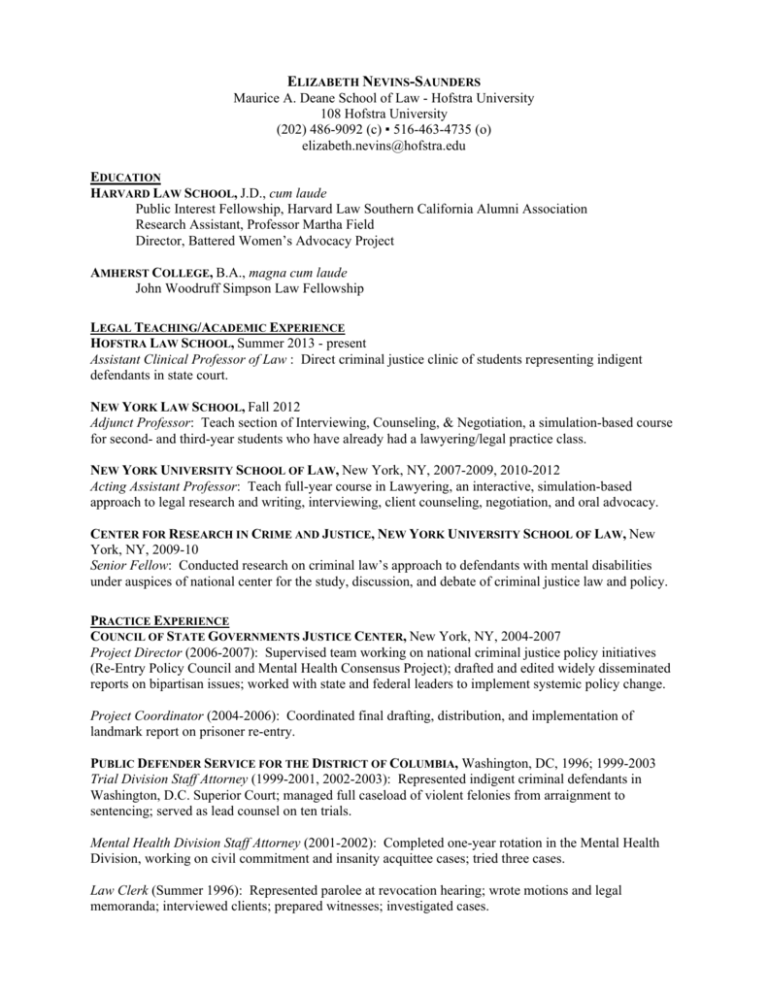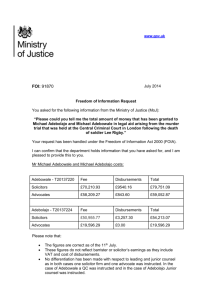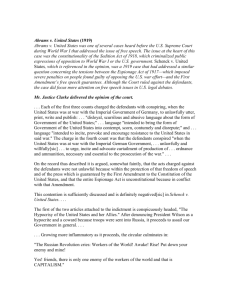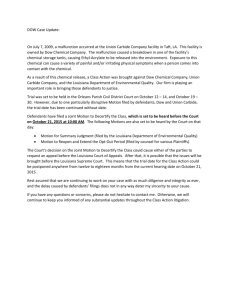Maurice A. Deane School of Law - Hofstra University 108 Hofstra
advertisement

ELIZABETH NEVINS-SAUNDERS Maurice A. Deane School of Law - Hofstra University 108 Hofstra University (202) 486-9092 (c) ▪ 516-463-4735 (o) elizabeth.nevins@hofstra.edu EDUCATION HARVARD LAW SCHOOL, J.D., cum laude Public Interest Fellowship, Harvard Law Southern California Alumni Association Research Assistant, Professor Martha Field Director, Battered Women’s Advocacy Project AMHERST COLLEGE, B.A., magna cum laude John Woodruff Simpson Law Fellowship LEGAL TEACHING/ACADEMIC EXPERIENCE HOFSTRA LAW SCHOOL, Summer 2013 - present Assistant Clinical Professor of Law : Direct criminal justice clinic of students representing indigent defendants in state court. NEW YORK LAW SCHOOL, Fall 2012 Adjunct Professor: Teach section of Interviewing, Counseling, & Negotiation, a simulation-based course for second- and third-year students who have already had a lawyering/legal practice class. NEW YORK UNIVERSITY SCHOOL OF LAW, New York, NY, 2007-2009, 2010-2012 Acting Assistant Professor: Teach full-year course in Lawyering, an interactive, simulation-based approach to legal research and writing, interviewing, client counseling, negotiation, and oral advocacy. CENTER FOR RESEARCH IN CRIME AND JUSTICE, NEW YORK UNIVERSITY SCHOOL OF LAW, New York, NY, 2009-10 Senior Fellow: Conducted research on criminal law’s approach to defendants with mental disabilities under auspices of national center for the study, discussion, and debate of criminal justice law and policy. PRACTICE EXPERIENCE COUNCIL OF STATE GOVERNMENTS JUSTICE CENTER, New York, NY, 2004-2007 Project Director (2006-2007): Supervised team working on national criminal justice policy initiatives (Re-Entry Policy Council and Mental Health Consensus Project); drafted and edited widely disseminated reports on bipartisan issues; worked with state and federal leaders to implement systemic policy change. Project Coordinator (2004-2006): Coordinated final drafting, distribution, and implementation of landmark report on prisoner re-entry. PUBLIC DEFENDER SERVICE FOR THE DISTRICT OF COLUMBIA, Washington, DC, 1996; 1999-2003 Trial Division Staff Attorney (1999-2001, 2002-2003): Represented indigent criminal defendants in Washington, D.C. Superior Court; managed full caseload of violent felonies from arraignment to sentencing; served as lead counsel on ten trials. Mental Health Division Staff Attorney (2001-2002): Completed one-year rotation in the Mental Health Division, working on civil commitment and insanity acquittee cases; tried three cases. Law Clerk (Summer 1996): Represented parolee at revocation hearing; wrote motions and legal memoranda; interviewed clients; prepared witnesses; investigated cases. THE CRIMINAL JUSTICE INSTITUTE, Cambridge, MA, 1996-1997 Student Attorney: Represented criminal defendants from arraignment to final case disposition. CROWELL & MORING LLP, Washington, DC, Summer 1996 Associate: Researched and drafted memoranda regarding government contracts, corporate defamation, and pro bono “Don’t Ask, Don’t Tell” litigation; advocated for homeless clients of pro bono clinic. NAACP LEGAL DEFENSE & EDUCATIONAL FUND, Los Angeles, CA, Summer 1995 Law Clerk: Investigated facts for municipal services equity challenge; researched and wrote memo on evidentiary privilege in civil rights litigation; second-seated depositions; developed fundraising strategy. PUBLICATIONS Not Guilty as Charged: The Myth of Mens Rea for Defendants with Mental Retardation, 45 U.C. DAVIS L. REV. 1419 (2012). This article picks up where Incomprehensible Crimes left off and probes the justifications for the prosecution of people with mental retardation, despite their lack of culpability. Using psychological and neuroscience research, I challenge the presumption of blameworthiness among these defendants inherent in a finding of mens rea. I propose a new approach which presumptively dismisses non-violent offenses and cabins sentencing for violent offenses. Incomprehensible Crimes: Defendants with Mental Retardation Charged with Statutory Rape, 85 N.Y.U. L. REV. 1067 (2010). This article challenges the prosecution of people with mental retardation for statutory rape on doctrinal and constitutional grounds. Because the presumptions about defendants undergirding this law are unfounded when it comes to people with mental retardation, I recommend that prosecutors bear the burden of proving that these defendants had the intent to commit statutory rape and that existing charging and sentencing practices be formalized to account for their mitigated culpability. MONICA ANZALDI WARD & HOPE GLASSBERG, RESPONDING TO PEOPLE WHO HAVE BEEN VICTIMIZED BY INDIVIDUALS WITH MENTAL ILLNESSES (2008) (contributor/editor). This policy guide provides recommendations for protecting the rights of victims in cases where the defendant has been found incompetent or not guilty by reason of insanity. RE-ENTRY POLICY COUNCIL, COUNCIL OF STATE GOV’TS, REPORT OF THE RE-ENTRY POLICY COUNCIL (2005) (contributor/lead editor). This landmark report provides hundreds of policy recommendations to policymakers seeking the safe and successful return of prisoners to the community. CLERKSHIP UNITED STATES DISTRICT COURT, DISTRICT OF COLORADO, THE HONORABLE EDWARD W. NOTTINGHAM, Denver, CO, 1997-99 SELECTED PRESENTATIONS AALS Clinical Legal Conference on Clinical Legal Education Work-in-Progress Scholarship Panel, June 15, 2011: “Not Guilty As Charged: The Myth of Mens Rea for Defendants with Mental Retardation” NYU Lawyering Faculty Scholarship Colloquium, February 24, 2011: “Not Guilty As Charged: The Myth of Mens Rea for Defendants with Mental Retardation” NYU Lawyering Faculty Scholarship Colloquium, August 4, 2010: “Enhancing Diminished Capacity” NYU Lawyering Faculty Scholarship Colloquium, May 28, 2009: “Cognitive Dissonance: Defendants with Mental Retardation Charged with Statutory Rape” Minnesota State Senate Justice and Finance Committee Hearing Testimony, August 23, 2005: “Prisoner Re-Entry – Recommendations for Consensus-Based Policy” U.S. Department of Justice National Conference on Offender Reentry, September 20, 2004: “Report Preview: Findings of the Re-Entry Policy Council” REFERENCES Andrew Williams, Director, Lawyering Program New York University School of Law, (212) 998-6044, andrew.williams@nyu.edu Peggy Cooper Davis, John S.R. Shad Professor of Lawyering and Ethics (Former Director, Lawyering Program) New York University School of Law, (212) 998-6465, peggy.cooper.davis@nyu.edu Austin D. Sarat, William Nelson Cromwell Professor of Jurisprudence & Political Science Amherst College, (413) 542-2308, adsarat@amherst.edu James B. Jacobs, Chief Justice Warren E. Burger Professor of Constitutional Law and the Courts; Director, Center for Research in Crime and Justice New York University School of Law, (212) 998-6213, JacobsJ@juris.law.nyu.edu Ronald Sullivan, Clinical Professor of Law; Director, Harvard Criminal Justice Institute (Former Director, Public Defender Service of the District of Columbia) Harvard Law School, (617) 496-4583, rsullivan@law.harvard.edu Charles Ogletree, Jesse Climenko Professor of Law (Former Director, Harvard Criminal Justice Institute) Harvard Law School, (617) 495-5097, ogletree@law.harvard.edu David Poole, Associate Justice, Boston Municipal Court (Former Litigation Director and Clinical Instructor, Harvard Criminal Justice Institute) Roxbury Division, Boston Municipal Court Department, (857) 445-6846, dpoole23@gmail.com Edward W. Nottingham, Former Chief Judge, U.S. District Court, District of Colorado Ed Nottingham, LLC, (303) 226-5667, e_w_nottingham@msn.com






